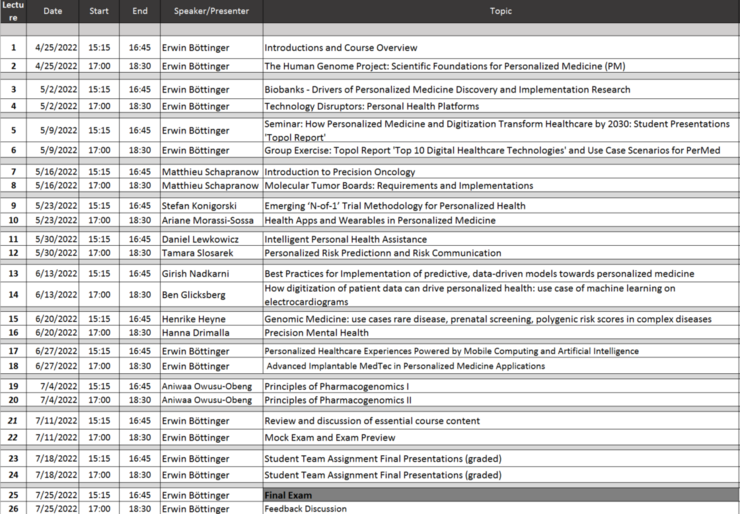Personalized Medicine (Sommersemester 2022)
Dozent:
Prof. Dr. Erwin Böttinger
(Digital Health - Personalized Medicine)
Allgemeine Information
- Semesterwochenstunden: 4
- ECTS: 6
- Benotet:
Ja
- Einschreibefrist: 01.04.2022 - 30.04.2022
- Prüfungszeitpunkt §9 (4) BAMA-O: 25.07.2022
- Lehrform: Vorlesung / Übung
- Belegungsart: Wahlpflichtmodul
- Lehrsprache: Englisch
Studiengänge, Modulgruppen & Module
- DICR: Digitalization of Clinical and Research Processes
- HPI-DICR-C Concepts and Methods
- DICR: Digitalization of Clinical and Research Processes
- HPI-DICR-T Technologies and Tools
- DICR: Digitalization of Clinical and Research Processes
- HPI-DICR-S Specialization
- APAD: Acquisition, Processing and Analysis of Health Data
- HPI-APAD-C Concepts and Methods
- APAD: Acquisition, Processing and Analysis of Health Data
- HPI-APAD-T Technologies and Tools
- APAD: Acquisition, Processing and Analysis of Health Data
- HPI-APAD-S Specialization
Beschreibung
Lecture starts 04/25/2022
Personalized medicine (PM) combines lifestyle, environment, genomic, and biologic information to identify molecular disease mechanisms with the aim of improving prevention, diagnosis and therapy while leading to a more efficient health system. Personalized Medicine is intensely data-driven and leverages health information systems, genomics, data sciences, and digital health methodologies and technologies. Real-world implementations of personalized medicine applications typically integrate digital health technologies and tools.
This course addresses the specialization areas ‘Digitalization of Clinical and Research Processes (DICR)’, ‘Acquisition, Processing and Analysis of Health Data (APAD)’, and ‘Scalable Computing Algorithms for Digital Health (SCAD)’ of the Digital Health Master program. It is designed to equip students with core knowledge and competencies in data-driven personalized medicine.
The course will deploy a mixed teaching format with lectures, seminars, and case studies with active student participation and a course-spanning in-depth team project.
Students will learn about foundations for Personalized Medicine, including the Human Genome Project and genomic sciences, emerging study designs for personalized health evidence generation, modern real-world biobanking, digital health assistance systems and health risk communication, disruptive health IT platforms and digital health technologies for personalized medicine.
Students will study use cases exemplifying personalized medicine in clinical practice, including pharmacogenomics, precision mental health, clinical genomics, and precision oncology.
Students will examine in-depth the introductory landmark Topol Report on ‘preparing the personalized, digital future of healthcare’ towards the beginning of the course in May, which will provide a base understanding for several project teams that will conduct an in-depth homework assignment, respectively, for a graded final presentation at the conclusion of the course in July. Lecture/exercise topics throughout the course may enhance the team project experience.
Learning Objectives:
- Understand and apply the concepts, definitions, approaches and terms in data-driven personalized medicine
- Critically assess impact of challenges and opportunities for personalized medicine
- Learn to make and communicate assessments and decisions on personalized medicine requirements in development and/or implementation of digital health solutions
- Ability to assess scope and sustainable benefits of digital tools, applications, and information in health behavior, prevention and management of disease
- Understand personalized medicine use case examples and how they impact clinical practice
- Apply learnings and work in teams developing a single chosen project throughout the course for an in-depth final presentation
Topics for the lecture (tentative schedule)

Literatur
- Ashley E. Towards precision medicine: applications of next generation sequencing. Nature Reviews Genetics 17:507-522, 2016
- Pritchard et al. Strategies for integrating personalized medicine in healthcare practice. Personalized Medicine Vol 14(2) Published Online 19 Jan 2017
- Personalized Medicine Coalition. Public perspectives on Personalized Medicine. Survey of U.S. public opinion May 2018
- Personalized Medicine Coalition. The Personalized Medicine Report 2017
- NHS The Topol Review. Preparing the healthcare workforce to deliver the digital future. An independent report on behalf of the Secretary of State for Health and Social Care, February 2019
- Nikles J, Mitchell G (eds) (2015). The essential guide to N-of-1 trials in health. Dordrecht: Springer.
Lern- und Lehrformen
Characteristics of Class Meetings/Lectures: Two lectures/seminars/case studies per week
We will use Zoom Meetings and openHPI course room (link to the course on openHPI will be provided after registration deadline to all registered participants )
Leistungserfassung
Student presentation: 50% of the final grade.
Written final exam: 50% of the final grade.
Termine
double block
Zurück

